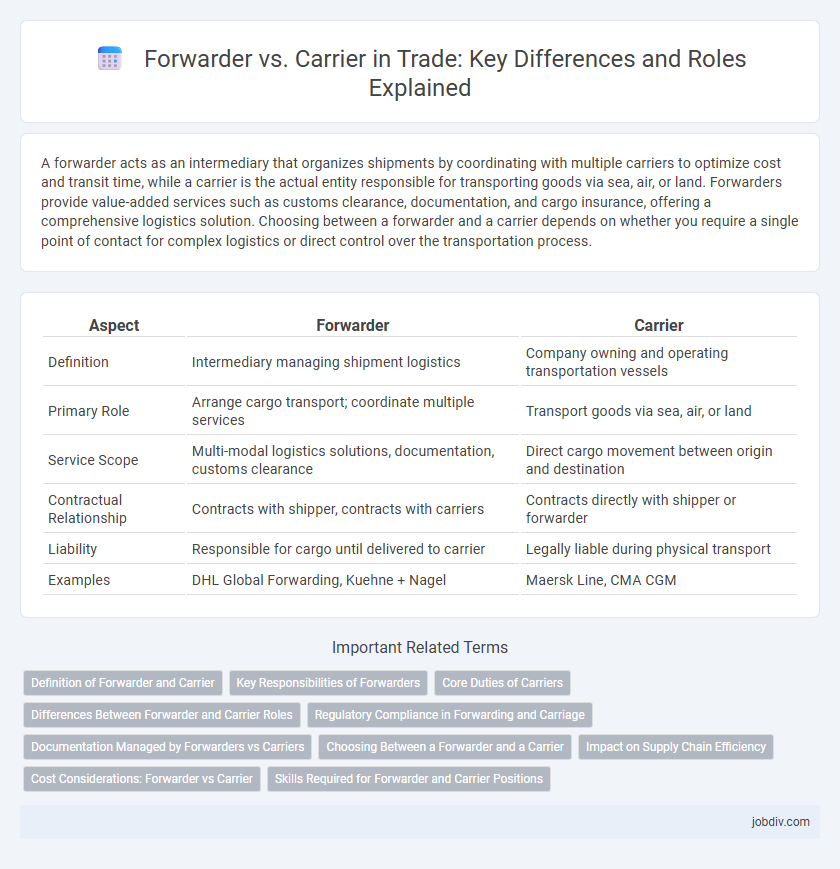A forwarder acts as an intermediary that organizes shipments by coordinating with multiple carriers to optimize cost and transit time, while a carrier is the actual entity responsible for transporting goods via sea, air, or land. Forwarders provide value-added services such as customs clearance, documentation, and cargo insurance, offering a comprehensive logistics solution. Choosing between a forwarder and a carrier depends on whether you require a single point of contact for complex logistics or direct control over the transportation process.
Table of Comparison
| Aspect | Forwarder | Carrier |
|---|---|---|
| Definition | Intermediary managing shipment logistics | Company owning and operating transportation vessels |
| Primary Role | Arrange cargo transport; coordinate multiple services | Transport goods via sea, air, or land |
| Service Scope | Multi-modal logistics solutions, documentation, customs clearance | Direct cargo movement between origin and destination |
| Contractual Relationship | Contracts with shipper, contracts with carriers | Contracts directly with shipper or forwarder |
| Liability | Responsible for cargo until delivered to carrier | Legally liable during physical transport |
| Examples | DHL Global Forwarding, Kuehne + Nagel | Maersk Line, CMA CGM |
Definition of Forwarder and Carrier
A forwarder acts as an intermediary responsible for arranging and coordinating the shipment of goods on behalf of the shipper, managing documentation, customs clearance, and logistics services without taking ownership of the cargo. A carrier is the company or individual that physically transports goods from one location to another, taking responsibility for the freight during transit and owning or leasing the transportation equipment, such as trucks, ships, or airplanes. Understanding the distinction is crucial for efficient supply chain management, as forwarders provide tailored logistics solutions while carriers execute the movement of goods.
Key Responsibilities of Forwarders
Freight forwarders coordinate the logistics of shipping by arranging cargo transport, managing documentation, and ensuring compliance with customs regulations. They act as intermediaries between shippers and carriers, optimizing routes and negotiating rates to streamline the supply chain. Forwarders also provide tracking, cargo insurance, and consolidate shipments to reduce costs and improve delivery efficiency.
Core Duties of Carriers
Carriers are responsible for the actual transportation of goods from one location to another, ensuring timely and safe delivery according to contractual agreements. They manage the operational aspects, including vehicle maintenance, route planning, and compliance with transportation regulations. Carriers also handle cargo liability during transit, making them a critical entity in the logistics and supply chain process.
Differences Between Forwarder and Carrier Roles
A forwarder specializes in organizing shipments by coordinating with multiple carriers, handling documentation, and ensuring customs clearance, while a carrier is responsible for the physical transportation of goods via sea, air, road, or rail. Forwarders act as intermediaries offering logistics solutions and consolidating cargo from various clients, whereas carriers provide the actual freight services using owned or leased vehicles. The primary difference lies in the forwarder's role in managing the supply chain and paperwork, contrasting with the carrier's direct accountability for moving goods.
Regulatory Compliance in Forwarding and Carriage
Forwarders play a critical role in ensuring regulatory compliance by managing documentation, customs clearance, and adherence to international trade laws, reducing legal risks for shippers. Carriers must comply with safety standards, environmental regulations, and transport-specific requirements, such as IMO rules for maritime shipping or FAA regulations for air cargo. Effective collaboration between forwarders and carriers ensures seamless compliance throughout the supply chain, minimizing delays and penalties in global trade operations.
Documentation Managed by Forwarders vs Carriers
Forwarders typically manage comprehensive shipment documentation including booking confirmations, customs paperwork, and cargo insurance, ensuring accurate handling of complex regulatory requirements. Carriers primarily focus on issuing transport-specific documents such as bills of lading or airway bills, which serve as proof of shipment and receipt. Proper coordination between forwarders and carriers on documentation is crucial for seamless international trade compliance and timely cargo delivery.
Choosing Between a Forwarder and a Carrier
Choosing between a forwarder and a carrier depends on the complexity of the shipment and specific logistical needs. Forwarders offer comprehensive services including route planning, customs clearance, and cargo consolidation, ideal for multi-modal or international shipments. Carriers provide direct transportation services, optimal for straightforward, single-mode shipments requiring a reliable delivery schedule.
Impact on Supply Chain Efficiency
Forwarders enhance supply chain efficiency by managing complex logistics, consolidating shipments, and providing flexible solutions across multiple carriers, which reduces delays and optimizes cost. Carriers directly control the transportation of goods, impacting transit times and reliability but often lack the broader coordination capabilities that forwarders offer. Efficient collaboration between forwarders and carriers is crucial for minimizing disruptions and improving overall supply chain performance.
Cost Considerations: Forwarder vs Carrier
Forwarders typically consolidate shipments from multiple clients, allowing for cost savings through bulk shipping rates and flexible routing options. Carriers offer direct transportation services, which may result in higher costs due to fixed schedules and dedicated assets but provide greater control and reliability. Evaluating shipment volume, delivery timelines, and service requirements is essential to determine the most cost-effective option between forwarders and carriers.
Skills Required for Forwarder and Carrier Positions
Forwarders require expertise in logistics coordination, customs regulations, and documentation management to ensure smooth cargo movement across borders. Carriers need strong operational skills, knowledge of transportation modes, and vessel or fleet management abilities to efficiently execute shipments. Both roles demand problem-solving skills and familiarity with trade compliance to optimize supply chain performance.
Forwarder vs Carrier Infographic

 jobdiv.com
jobdiv.com